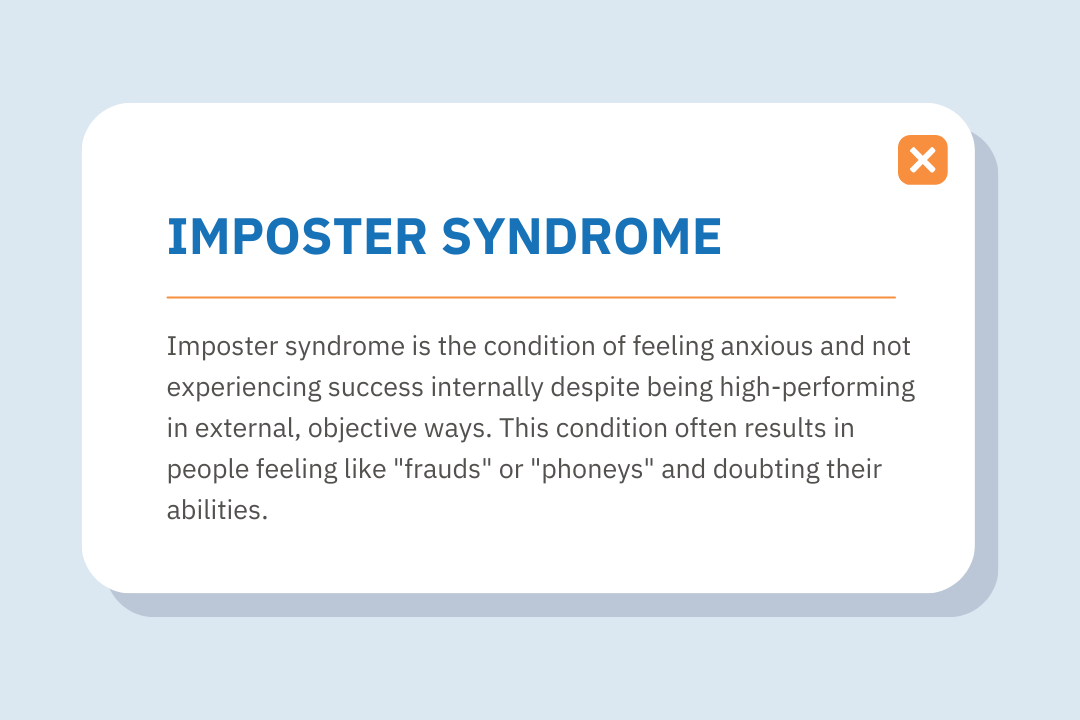-3.png)
Conquering Imposter Syndrome: Strategies for Business Leaders
by Tara Covell
Have you ever achieved a significant milestone but found yourself questioning whether you truly deserved it? Or have you ever doubted your abilities despite a track record of success? This common experience, called Imposter Syndrome, can affect high achievers such as business leaders and entrepreneurs at a surprising rate.

Imposter Syndrome is a prevalent psychological challenge that even the most accomplished business leaders face. It breeds self-doubt and the fear of being exposed as a fraud despite a history of achievements and competence.
In this article, we'll explore Imposter Syndrome, its potential impact on your career, and strategies for managing it. Whether you are a seasoned professional or new to entrepreneurship, this guide provides practical advice for navigating its effects.
What is Imposter Syndrome?

Imposter Syndrome is a psychological pattern characterised by persistent feelings of self-doubt and a fear of being exposed as a fraud. Despite external evidence of success, individuals struggling with Imposter Syndrome attribute their accomplishments to luck or external factors rather than their own competence.
It often stems from high expectations and perfectionism, as well as comparing yourself to others. It's important to note that imposter syndrome differs from having a healthy dose of humility or caution. People who suffer from this syndrome feel that they are not as competent as others in the same situation despite objectively being competent. This can cause them to feel like time is running out and that they will soon be exposed as a fraud.
Many high achievers experience imposter syndrome, and they suffer in silence because of the shame and fear of being exposed. If you feel like you're not good enough, know that you're not alone. It's okay to talk about it and seek support. Remember, success is not just about achieving things but also about learning and growing. So, be kind to yourself and embrace your achievements.
Recognising these patterns of thinking is crucial in addressing imposter syndrome. The first step in addressing this psychological condition is understanding it.
Why does Imposter Syndrome matter?
Imposter Syndrome can be a massive hurdle for business leaders and entrepreneurs. It can be responsible for:
- Hindering decision-making: The fear of being wrong can lead to procrastination and indecisiveness. This feeling can be especially problematic in fast-paced business environments, where quick decision-making is often required.
- Impeding growth opportunities: Self-doubt can prevent individuals from taking on new challenges or pursuing ambitious goals for fear of failure. This can lead to missed opportunities and a need for growth for the individual and the business they lead.
- Affecting mental well-being: Constant self-criticism and feelings of inadequacy can lead to anxiety, stress, and even burnout. Feeling constantly like you are not good enough can be emotionally and mentally exhausting, and this can take a toll on one's overall well-being.
Imposter Syndrome in Leadership
Understanding the scale of Imposter Syndrome within leadership teams is crucial. According to an article published in the Harvard Business Review, a significant proportion of technology leaders have experienced Imposter Syndrome at some point in their careers. The research indicates that 58% of tech leaders report experiencing feelings of inadequacy and self-doubt, which can lead to a lack of confidence and an inability to recognise their own achievements.
Imposter Syndrome is particularly prevalent among C-suite executives, with 70% acknowledging it as a significant career challenge. Women in leadership positions are also disproportionately affected, with 75% reporting experiencing these feelings, which can substantially impact their professional development and overall success.
Entrepreneurs and start-up founders are also at risk of experiencing Imposter Syndrome, with 62% of them reporting similar feelings of self-doubt and inadequacy. This feeling can be particularly challenging for those in these roles, as the demands of entrepreneurship require a high level of confidence and self-assurance.
Strategies for Overcoming Imposter Syndrome
Overcoming imposter syndrome requires a combination of self-reflection, mindset shifts, and practical strategies. Here are some effective strategies for overcoming imposter syndrome:
- Acknowledge your accomplishments and give yourself credit for your achievements. Remind yourself of your skills, experiences, and the hard work you have put in to reach your current position.
- Embrace failure as a learning opportunity. Understand that making mistakes is a natural part of the growth process. Instead of dwelling on failures, focus on the lessons learned and how they have contributed to your development.
- Surround yourself with a supportive network of mentors, colleagues, and friends who can provide encouragement and perspective. Seek feedback and advice from those you trust.
- Practice self-compassion and be kind to yourself. Treat yourself with the same kindness and understanding you would show a friend facing similar challenges.
- Challenge negative thoughts and replace them with positive affirmations. Remind yourself of your capabilities and the value you bring to your role as a leader.
- Set realistic goals and celebrate your progress along the way. Break larger tasks into smaller, manageable steps to avoid feeling overwhelmed.
- Continuously invest in your personal and professional growth through learning and development opportunities. The more you expand your knowledge and skills, the more confident you will feel in your abilities.
...
Imposter Syndrome is a real challenge, but it doesn't have to hold you back. By acknowledging its presence, implementing the above strategies, and surrounding yourself with a supportive network, you can overcome self-doubt and embrace your full potential as a leader.
Within The Alternative Board community, our facilitators and peer boards offer invaluable support and have a wealth of knowledge to share. If you think this could help you overcome imposter syndrome, don't hesitate to get in touch.
Get in touch
Connect with us and discover how we can help you.
Related articles

Kindness in Leadership: The Competitive Advantage Most Businesses Miss
Discover why kindness in leadership drives performance, trust and culture. TABcast insights on psychological safety, coaching and values-led growth.

How Strategic Alignment Workshops Drive Real Execution
Many strategy workshops create alignment in the room — but little action after. Learn how structured strategic alignment drives execution.

Why Accountability Breaks Down as Businesses Grow (And How to Fix It)
As businesses grow, accountability often slips. Learn why it happens and how leaders restore clarity, ownership, and execution.



